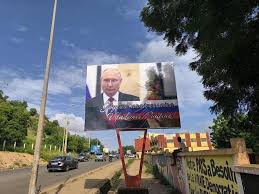
Russia Set to Strengthen Economic and Military Partnerships in Africa

 :
| Updated On: 11-Jun-2025 @ 11:52 am
:
| Updated On: 11-Jun-2025 @ 11:52 amSHARE
Russia is actively working to expand its economic and military influence across Africa, as confirmed by the Kremlin. This strategy is part of Moscow’s broader geopolitical agenda to fill the power vacuum created by the retreat of Western powers, particularly in West Africa, which has witnessed a series of military coups in recent years. Kremlin spokesman Dmitry Peskov stated that Russia's presence in Africa is steadily increasing and emphasized a comprehensive approach to relations with African nations, especially in economic, investment, defence, and security sectors.
Peskov highlighted that these efforts are not limited to trade and development but also encompass sensitive areas such as military collaboration and security assistance. This expansion reflects Russia’s intent to assert itself as a major player in Africa, countering the influence of countries like France and the United States, both of which have seen a diminishing presence in several African nations. France, the former colonial power in many West African states, has particularly been sidelined, with its forces being expelled or voluntarily withdrawing from countries such as Mali.
Russia's military involvement is particularly visible in countries like Mali, the Central African Republic, and Equatorial Guinea. In Mali, Russia initially engaged through the controversial Wagner Group, a private paramilitary organization known for its aggressive tactics and close ties to the Kremlin. The Wagner Group played a significant role in supporting Mali’s military government in its fight against armed insurgents following the 2020 and 2021 coups.
However, recent reports indicate that Wagner is exiting Mali. Despite this, Russia is not scaling down its involvement. Instead, a new Kremlin-controlled force known as the Africa Corps will replace Wagner’s operations. The Africa Corps, supported by the Russian Ministry of Defence, was established after the failed June 2023 mutiny led by Wagner founder Yevgeny Prigozhin and commander Dmitry Utkin. Both men died in a plane crash two months later, and the Russian government has since shifted its focus from irregular paramilitary groups to more structured and officially backed operations.
According to intelligence gathered from Telegram channels used by Russian mercenaries and reported by Reuters, about 70–80% of the Africa Corps personnel are former Wagner operatives. However, the Africa Corps operates differently. Its mandate places greater emphasis on training local forces, providing military equipment, and offering protection services, rather than direct combat engagement. This marks a strategic shift in Russia’s military involvement, aiming for a more sustainable and less confrontational presence.
Ulf Laessing, head of the Sahel program at the Konrad Adenauer Foundation, noted that the Africa Corps’ operations reflect a “lighter footprint” compared to the combat-heavy Wagner Group. While Wagner was known for direct involvement in conflict zones, the Africa Corps focuses on building long-term capabilities in African military forces, especially in training and logistical support.
In conclusion, Russia’s evolving presence in Africa highlights a calculated and multifaceted strategy to extend its geopolitical reach, leveraging both economic partnerships and military cooperation. By transitioning from Wagner to the Africa Corps, Russia seeks to institutionalize its influence in a way that ensures continued presence and strategic advantage across the continent, particularly in politically unstable regions like West Africa.
Contact Us
House. No. : 163, Second Floor Haridev Rd, near Puberun Path, Hatigaon,Guwahati, Assam 781038.
E-mail : assaminkcontact@gmail.com
Contact : +91 8811887662
Enquiry
×
Reporter Login
×